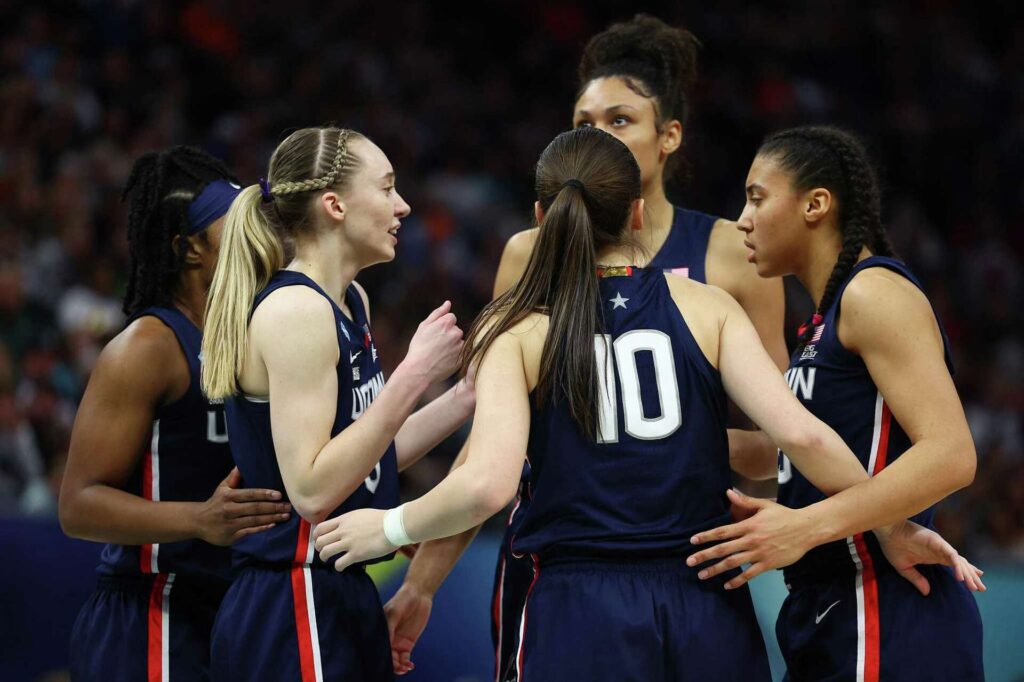With just over a minute and a half left in Sunday’s NCAA women’s basketball national championship game, UConn guard Paige Bueckers walked off the court.
With victory clearly in sight for the Huskies, head coach Geno Auriemma checked his starters out of the game, including Bueckers, a fifth-year senior who’s spent her entire career in Storrs.
As she stepped off the court wearing a UConn jersey for the final time, she walked over to Auriemma and swept him up in an emotional embrace as Bueckers’s collegiate career reached its storybook ending.
Bueckers was the engine that powered this season’s UConn team to the top of the mountain. With her leadership, UConn women’s basketball is the NCAA national champion for the first time since 2016.
South Carolina – the team UConn beat handily Sunday by a score of 82-59 – rose up as the primary candidate to establish the next premier dynasty in women’s basketball while the Huskies vacated that pedestal over the last nine years.
Sunday, the Huskies reclaimed their throne. Making the resounding statement that UConn women’s basketball is still the epitome of persistent dominance.
“There were a lot of people that hoped it would never happen,” Auriemma said postgame Sunday. “I’m glad that we were able to get to that spot that Connecticut has occupied — not that we had to win a championship, but in the last 30 years I don’t know that any program’s meant more to their sport than what UConn has meant to women’s basketball.”
Since winning the program’s first national championship in 1995, UConn has firmly held a place among the upper echelon of NCAA women’s basketball programs. From 2000-04, UConn won four out of five national championships. From 2013-16, the Huskies won four in a row. From 1995-2016, UConn never went more than five years without making it to the top of the podium.
That changed in 2017.
On March 31, 2017, at the Final Four in Dallas, then-Mississippi State guard Morgan Williams changed the trajectory of UConn’s legacy, an act that took the Huskies almost a full decade to correct.
With the Bulldogs tied 64-64 with the Huskies and three seconds left on the clock, Williams caught a pass while standing on the halfcourt logo. She took three dribblesforward and stopped just to the right of the paint about 15 feet from the basket. She loaded her shot and let it fly.
As the buzzer rang, the ball fell through the net, ending the Huskies’ 111-game winning streak.
“One play doesn’t cost you a game,” Auriemma said of the shot then. “But a lot of times, one play will win you a game. That’s exactly what she did.”
The next year, a buzzer-beater by Notre Dame’s Arike Ogunbowale sent the Huskies packing in the Final Four once again. In 2019, the Huskies met the same fate, losing to Notre Dame in the semifinals.
After the COVID-19 pandemic forced the NCAA to cancel the 2020 tournament, UConn, led by freshman phenom Bueckers, emerged as one of the 2021 tournament’s favorites. But it fell victim to the tournament’s Cinderella squad, Arizona, in the Final Four. In 2022, UConn finally made it back to the championship game, but the Huskies were no match for an Aliyah Boston-led South Carolina.
The following year, UConn didn’t even make it out of the Sweet 16, with Bueckers sidelined with a torn ACL. In 2024, upon Bueckers’s return, UConn was an illegal screen away from beating Iowa to advance to the championship game, but the basketball gods had other plans.
Year after year, UConn competed as one of the top teams in the country. They consistently positioned themselves as tournament favorites and genuine contenders, yet year after year they couldn’t get over the barrier.
While UConn tried to reclaim its throne, a new superpower emerged.
Williams’s buzzer-beater in 2017 put the Bulldogs on a collision course with South Carolina, led by All-American forward A’ja Wilson and Dawn Staley, who was quickly building a reputation as one of the best minds in basketball.
Staley took South Carolina from anonymity in the 2008-09 season – the Gamecocks were 10-18 in her first season – to a superpower and national champion in the 2016-17 season.
During UConn’s championship drought, the Gamecocks won three titles. In 2022, it seemed they had cemented their status as the new dynasty taking over women’s basketball by beating UConn in the title game. Each year, the Gamecocks were highlighted as the team to beat coming into the season.
“There’s no other women’s college basketball student-athlete has what they have, experienced what they’ve experienced, won as much as they’ve won – and that’s championships and that’s games,” Staley said of her senior class postgame Sunday. “So it was them that built this and it’s them that will go out again as the most winningest class – I’m going to venture to say in the country. So I’m proud of them.”
South Carolina matched UConn in almost every facet it could. Three of the top 10 players in the 2019 recruiting class committed to Dawn Staley and South Carolina. UConn’s only top 100 recruit that year was No. 21 Aubrey Griffin.
In 2021, Staley and Auriemma went pound for pound with all of the top five players in the recruiting class committing to one of the two schools.
In Sunday’s game, two of the best players on the floor were 2024 No. 1 overall recruit Sarah Strong for UConn and No. 3 overall recruit Joyce Edwards for South Carolina.
“It shows that Joyce is a dog,” South Carolina senior guard Bree Hall said Sunday. “She’s an incredible player. I’m so glad I’ve been able to enjoy my senior year with her by my side. And she’s going to come back for more. It’s not over for her at all.”
With the help of Wilson’s overnight rise to stardom in the WNBA, Staley and South Carolina’s profile elevated quickly.
South Carolina became a machine where even the most underrated recruits could develop into WNBA-caliber talent. Several Gamecocks who spent most of their careers coming off the bench became desired commodities come WNBA draft time.
Since Dawn’s takeover, in addition to Wilson, former Gamecocks like Allisha Gray, Tiffany Michell, Tyasha Harris, and more recently, Aliyah Boston and Kamilla Cardoso have proven that South Carolina is a place recruits can go if they want to be molded into WNBA players.
From this season’s roster Hall, Te-Hina Paopao and Sania Feagin are all projected to land with one of the WNBA’s 13 teams for training camp, and with the years of preparation they’ve received from Staley, it’s not presumptuous to think that all three have a valid shot at making an opening day roster.


